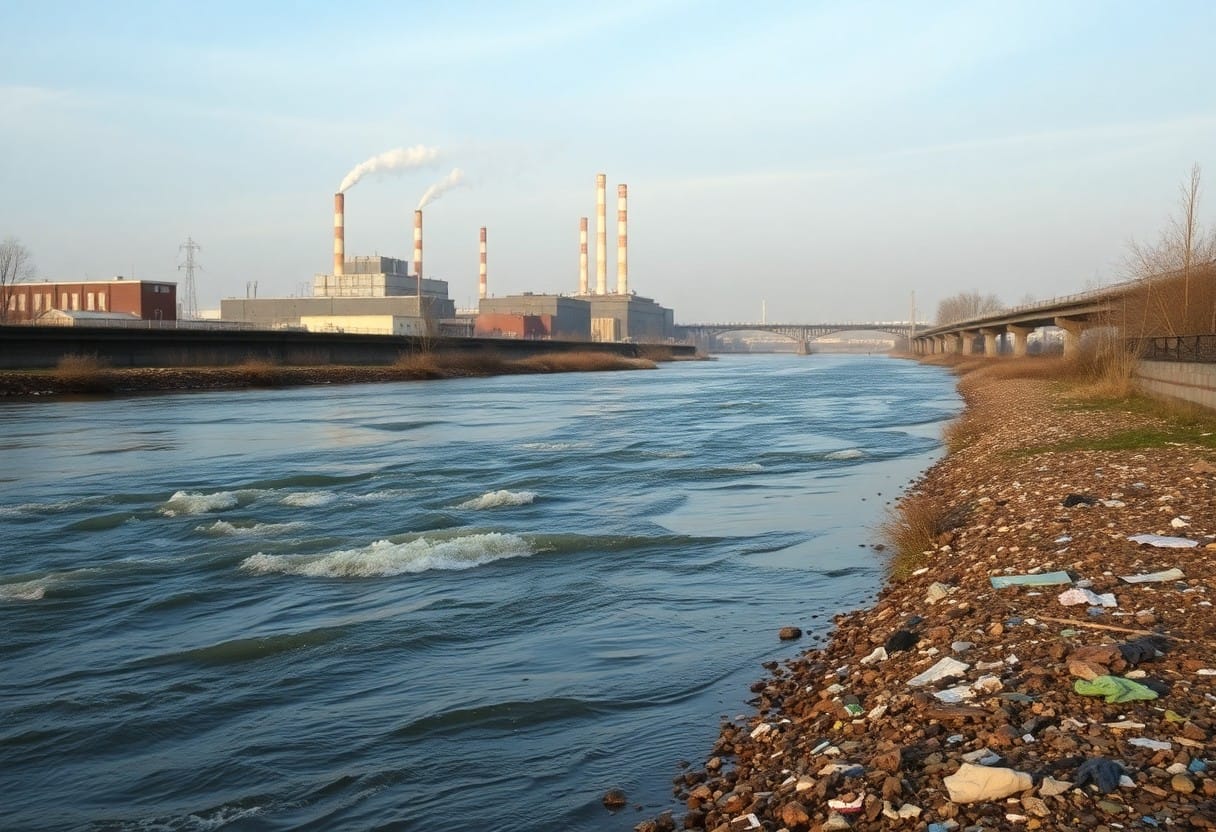PFAS, often termed “forever chemicals,” pose a significant health risk in your drinking water, especially in Fayetteville, where Chemours has been linked to contamination. These harmful substances can remain in your system for years, leading to serious health issues such as liver damage and immune system dysfunction. Recently, Chemours to expand well testing for PFAS contamination, urging residents to stay informed about potential dangers and take action to safeguard your water supply.
Overview of PFAS
The impact of PFAS, or per- and polyfluoroalkyl substances, on our environment and health is becoming increasingly evident. These synthetic chemicals have been widely used in various industries since the 1940s, leading to their pervasive presence in drinking water sources across the globe. Their resistance to degradation makes them a persistent environmental concern, particularly in areas close to industrial sites.
Definition and Types of PFAS
The definition of PFAS includes a broad range of over 5,000 chemical compounds, predominantly grouped into two categories:
| Types | Description |
| PFOA | Perfluorooctanoic acid, often used in non-stick cookware. |
| PFOS | Perfluorooctane sulfonate, found in stain-resistant fabrics. |
| PFNA | Perfluorononanoic acid, associated with various industrial applications. |
| FOSA | Perfluorooctane sulfonamide, used as a surfactant in various products. |
| GenX | A newer replacement for PFOA, still under scrutiny for safety. |
Knowing the types of PFAS present in your area can help you take appropriate actions to protect your water supply.
Health Risks Associated with PFAS
Risks associated with PFAS exposure pose serious concerns over time. Studies indicate that these chemicals can lead to adverse health effects, including high cholesterol, liver damage, immune system disruptions, and an increased risk of certain cancers.
Overview of the health risks associated with PFAS indicates that exposure, even at low levels, can significantly impact your body. These chemicals have been linked to thyroid disease, reproductive issues, and decreased vaccine efficacy in children. Staying informed can empower you to mitigate exposure through proper filtration systems and advocating for better regulations in your community. Protecting your health is paramount, and understanding these risks is the first step towards ensuring your safety.

Chemours’ Role in PFAS Contamination
Some residents may not be fully aware of how Chemours contributes to the pervasive issue of PFAS contamination in the Fayetteville area. This chemical manufacturing giant has been linked to the release of harmful substances that threaten your drinking water and overall health. The long-lasting effects of these chemicals highlight the urgent need for transparency and the implementation of safety measures to protect your community.
History of Chemours in Fayetteville
Around the mid-20th century, Chemours established its operations in Fayetteville, bringing economic growth but also introducing potential environmental hazards. Over the years, the company has produced various chemicals, including those in the PFAS family, raising serious questions about the long-term impact of their practices on local water sources.
Sources of Contamination
Behind Chemours’ manufacturing processes lie several sources of PFAS contamination that directly affect your drinking water. The company’s activities, including the production and disposal of waste, have resulted in the leaching of toxic substances into surrounding waterways and groundwater systems.
In fact, the manufacturing waste from Chemours has repeatedly been cited as a major contributor to the presence of PFAS compounds in Fayetteville’s water supply. This contamination can occur through unregulated discharge into local rivers and streams, or by leaching from landfills where these chemicals are improperly disposed of. Your community is at risk as these substances accumulate in the environment, leading to potentially severe health implications, including cancer and immune system disorders. Awareness and action are vital in safeguarding your access to clean drinking water.
Impact on Fayetteville Drinking Water
It is important to recognize the impact of PFAS contamination from Chemours on Fayetteville’s drinking water. The presence of these harmful substances not only jeopardizes the safety of your water supply but also raises concerns about long-term environmental health in the region.
Water Quality Testing and Results
Between 2016 and 2021, several water quality tests indicated elevated levels of PFAS in Fayetteville’s drinking water. These findings have led to significant community concern and have underscored the urgent need for ongoing monitoring and remediation efforts.
Community Health Effects
Results from studies linking PFAS exposure have revealed alarming health risks associated with contaminated drinking water. Many residents have expressed worries about potential health issues, including increased chances of certain cancers and reproductive problems.
Fayetteville’s residents are understandably concerned about the health risks posed by PFAS exposure in their drinking water. Studies have shown that these chemicals can lead to serious health complications, including an increased risk of kidney and testicular cancer, liver damage, and impacts on immune system function. Furthermore, potential developmental issues in children have been linked to PFAS exposure, emphasizing the significance of addressing this contamination to protect your health and well-being.
Regulatory Response
Unlike many emerging contaminants, the regulatory framework surrounding PFAS remains fragmented and often insufficient. While some federal guidelines exist, they may not adequately protect your health or ensure safe drinking water in Fayetteville. Increased awareness is pushing for more comprehensive regulations, but the response has been slow and inconsistent.
Current Regulations Surrounding PFAS
Among the existing regulations, the Environmental Protection Agency (EPA) has established certain health advisories for specific PFAS compounds, yet these do not translate into enforceable standards. Many state regulations vary greatly, leaving you vulnerable to unknown levels of PFAS in your drinking water.
Efforts by Local Authorities
Against this backdrop of limited federal and state regulations, local authorities in Fayetteville have taken initiative to address PFAS contamination. Your local government has begun testing water sources and raising awareness about potential risks, pushing for better monitoring and management of these dangerous chemicals.
Current efforts by local authorities include testing drinking water supplies for PFAS levels and initiating public education campaigns to inform residents about the risks associated with these substances. Additionally, local leaders are advocating for stronger state-level regulations and collaborating with environmental organizations to promote safer alternatives. These proactive steps are important to ensure that you are protected from the silent threats posed by PFAS contaminants in your drinking water.
Community Awareness and Action
Not only is it vital for you to be aware of the PFAS contamination in Fayetteville’s drinking water, but also to engage in community discussions and actions. Local organizations and residents are coming together to raise awareness and demand change. You can learn more about the ongoing PFAS problem and its implications by reading Forever chemicals, forever concerns: Cape Fear River and ….
Advocacy Groups and Initiatives
Below are various advocacy groups and initiatives actively working to address the PFAS issue in your community. These organizations are dedicated to educating the public, pushing for legislative action, and holding polluters accountable. By joining these efforts, you can help amplify the call for clean drinking water and healthier communities.
Public Education Efforts
Behind every successful movement is a foundation of public awareness. Local advocacy groups are implementing educational campaigns to inform you about the dangers of PFAS in drinking water. To support these initiatives, communities are organizing workshops, distributing informational materials, and hosting events designed to empower you with knowledge about how to avoid exposure, test your water quality, and advocate for policy changes. By participating, you contribute to a brighter future where your drinking water is safe and free of harmful chemicals.
Future Implications
Once again, PFAS contamination raises alarms about the long-term safety of Fayetteville’s drinking water. If left unaddressed, the presence of these harmful chemicals can compromise not only your health but also the integrity of local ecosystems. Future regulations may pressure Chemours and other industries to adopt sustainable practices, but the timeline for improvement remains uncertain, leaving residents at risk.
Long-Term Environmental Effects
Among the many concerns surrounding PFAS is their persistent presence in the environment. These substances do not break down easily, which means they can accumulate in soil and water sources, potentially disrupting aquatic life and food chains. If you consider the implications on biodiversity, the long-lasting effects of PFAS can ripple through ecosystems for generations.
Ongoing Monitoring and Remediation Efforts
About the remediation of PFAS in Fayetteville, local authorities are actively working to monitor contamination levels in drinking water. This ongoing effort aims to reduce exposure and strive for safer water quality. By staying informed, you can contribute to community awareness and push for accountability from stakeholders.
Remediation efforts involve advanced water treatment technologies designed to filter out PFAS compounds from water supplies effectively. Continued funding and support for these initiatives are important to ensure the safety of your drinking water. Collaboration between the local government, health agencies, and the community will drive the success of these efforts. By engaging with local organizations, you can help advocate for further research and accountability to protect both human health and the environment.
To wrap up
With these considerations, you should be aware of the ongoing threat that PFAS contamination poses to Fayetteville’s drinking water. The presence of these harmful chemicals, linked to various health risks, underlines the importance of staying informed about local water safety initiatives and advocating for transparent monitoring practices. Your proactive engagement can help ensure that the health of your community and environment is prioritized, facilitating a safer water supply for you and your family.



















